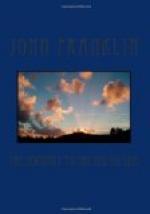In the afternoon we got into a more hilly country where the ground was strewed with large stones. The surface of these was covered with lichens of the genus gyrophora which the Canadians term tripe de roche. A considerable quantity was gathered and with half a partridge each (which we shot in the course of the day) furnished a slender supper which we cooked with a few willows dug up from beneath the snow. We passed a comfortless night in our damp clothes but took the precaution of sleeping upon our socks and shoes to prevent them from freezing. This plan was afterwards adopted throughout the journey.
At half-past five in the morning we proceeded and after walking about two miles came to Cracroft’s River, flowing to the westward with a very rapid current over a rocky channel. We had much difficulty in crossing this, the canoe being useless, not only from the bottom of the channel being obstructed by large stones, but also from its requiring gumming, an operation which, owing to the want of wood and the frost, we were unable to perform. However after following the course of the river some distance we effected a passage by means of a range of large rocks that crossed a rapid. As the current was strong and many of the rocks were covered with water to the depth of two or three feet, the men were exposed to much danger in carrying their heavy burdens across, and several of them actually slipped into the stream but were immediately rescued by the others. Junius went farther up the river in search of a better crossing-place and did not rejoin us this day. As several of the party were drenched from head to foot and we were all wet to the middle, our clothes became stiff with the frost and we walked with much pain for the remainder of the day. The march was continued to a late hour from our anxiety to rejoin the hunters who had gone before, but we were obliged to encamp at the end of ten miles and a quarter without seeing them. Our only meal today consisted of a partridge each (which the hunters shot) mixed with tripe de roche. This repast, although scanty for men with appetites such as our daily fatigue created, proved a cheerful one and was received with thankfulness. Most of the men had to sleep in the open air in consequence of the absence of Credit who carried their tent, but we fortunately found an unusual quantity of roots to make a fire, which prevented their suffering much from the cold though the thermometer was at 17 degrees.
We started at six on the 9th and at the end of two miles regained our hunters who were halting on the borders of a lake amidst a clump of stunted willows. This lake stretched to the westward as far as we could see and its waters were discharged by a rapid stream one hundred and fifty yards wide. Being entirely ignorant where we might be led by pursuing the course of the lake, and dreading the idea of going a mile unnecessarily out of the way, we determined on crossing the river if possible, and the canoe was gummed for




